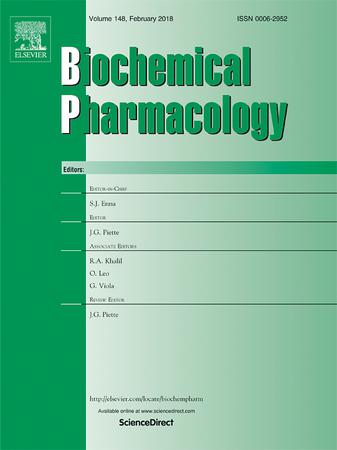胆固醇代谢:克服肿瘤耐药的策略
IF 5.6
2区 医学
Q1 PHARMACOLOGY & PHARMACY
引用次数: 0
摘要
尽管靶向肿瘤治疗取得了重大进展,但耐药性的出现仍然是一个复杂的挑战。肿瘤细胞内胆固醇积累通过多种机制在介导耐药中起着至关重要的作用,包括改变膜动力学、增强药物外排和激活生存信号通路。针对胆固醇代谢提出了一种创新的策略,以提高治疗的敏感性,特别是在乳腺癌。因此,正在进行的涉及降胆固醇药物的临床前研究和临床试验为改善肿瘤治疗结果指明了一个有希望的方向。这些药物与现有治疗方案的结合可能会提高疗效,突出了在这一重要领域继续研究的必要性。本文综述了胆固醇代谢对肿瘤,特别是实体肿瘤耐药的影响,确定了这一代谢途径的治疗靶点(特别关注乳腺癌),并讨论了临床前降胆固醇药物的最新进展,以及那些已经进入临床试验的降胆固醇药物。本文章由计算机程序翻译,如有差异,请以英文原文为准。

Cholesterol metabolism: A strategy for overcoming drug resistance in tumors
Despite significant advancements in targeted tumor therapies, the emergence of drug resistance remains a complex challenge. Cholesterol accumulation within tumor cells plays a crucial role in mediating drug resistance through various mechanisms, including altered membrane dynamics, enhanced drug efflux, and activation of survival signaling pathways. Targeting cholesterol metabolism presents an innovative strategy to enhance therapeutic sensitivity, particularly in breast cancer. Consequently, ongoing preclinical studies and clinical trials involving cholesterol-lowering agents indicate a promising direction for improving treatment outcomes in tumors. The combination of these agents with existing therapeutic regimens may lead to enhanced efficacy, highlighting the necessity for continued research in this vital area. This review examines the impact of cholesterol metabolism on drug resistance in tumors, particularly solid tumors, identifies therapeutic targets in this metabolic pathway (with a special focus on breast cancer), and discusses recent advances in cholesterol-lowering drugs in preclinical, as well as those that have entered clinical trials.
求助全文
通过发布文献求助,成功后即可免费获取论文全文。
去求助
来源期刊

Biochemical pharmacology
医学-药学
CiteScore
10.30
自引率
1.70%
发文量
420
审稿时长
17 days
期刊介绍:
Biochemical Pharmacology publishes original research findings, Commentaries and review articles related to the elucidation of cellular and tissue function(s) at the biochemical and molecular levels, the modification of cellular phenotype(s) by genetic, transcriptional/translational or drug/compound-induced modifications, as well as the pharmacodynamics and pharmacokinetics of xenobiotics and drugs, the latter including both small molecules and biologics.
The journal''s target audience includes scientists engaged in the identification and study of the mechanisms of action of xenobiotics, biologics and drugs and in the drug discovery and development process.
All areas of cellular biology and cellular, tissue/organ and whole animal pharmacology fall within the scope of the journal. Drug classes covered include anti-infectives, anti-inflammatory agents, chemotherapeutics, cardiovascular, endocrinological, immunological, metabolic, neurological and psychiatric drugs, as well as research on drug metabolism and kinetics. While medicinal chemistry is a topic of complimentary interest, manuscripts in this area must contain sufficient biological data to characterize pharmacologically the compounds reported. Submissions describing work focused predominately on chemical synthesis and molecular modeling will not be considered for review.
While particular emphasis is placed on reporting the results of molecular and biochemical studies, research involving the use of tissue and animal models of human pathophysiology and toxicology is of interest to the extent that it helps define drug mechanisms of action, safety and efficacy.
 求助内容:
求助内容: 应助结果提醒方式:
应助结果提醒方式:


